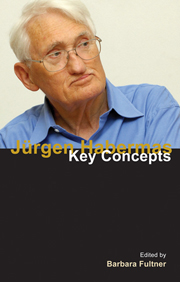Book contents
- Frontmatter
- Contents
- Contributors
- Acknowledgements
- Abbreviations
- Introduction
- 1 Historical and intellectual contexts
- PART I COMMUNICATIVE RATIONALITY
- 2 Postmetaphysical thinking
- 3 Communicative action and formal pragmatics
- 4 System and lifeworld
- 5 Autonomy, agency and the self
- PART II MORAL AND POLITICAL THEORY
- PART III POLITICS AND SOCIAL CHANGE
- Chronology of life and works
- Bibliography
- Index
3 - Communicative action and formal pragmatics
from PART I - COMMUNICATIVE RATIONALITY
- Frontmatter
- Contents
- Contributors
- Acknowledgements
- Abbreviations
- Introduction
- 1 Historical and intellectual contexts
- PART I COMMUNICATIVE RATIONALITY
- 2 Postmetaphysical thinking
- 3 Communicative action and formal pragmatics
- 4 System and lifeworld
- 5 Autonomy, agency and the self
- PART II MORAL AND POLITICAL THEORY
- PART III POLITICS AND SOCIAL CHANGE
- Chronology of life and works
- Bibliography
- Index
Summary
In the early 1970s, Jürgen Habermas undertook a linguistic turn in critical theory. Motivated by the fact that humans engage in activities that are meaningful to them, he argued that social actions and interactions can be fruitfully analysed as having a linguistic structure. He developed an account of communicative competence, called formal pragmatics, and elaborated the concept of communicative action, which he had used less systematically until that time. These lie at the core not only of what eventually became The Theory of Communicative Action, but also of his discourse ethics, elaborated in the 1980s, his theory of democracy, and his theory of law, developed in the 1990s. It is fair to say that Habermas's entire theoretical edifice stands on the foundation of his account of human communication, more specifically, of how we use language in order to reach mutual understanding with one another. This, to him, is the most fundamental form of action coordination. Although formal pragmatics did not begin as a theory of meaning per se, it has implications for such a theory, and the linguistic turn in social theory corresponds to a pragmatic turn in the theory of meaning. An adequate theory of meaning, for Habermas, must account for the socially binding force and action-coordinating function of language, and it must do so by subsuming its semantic dimension in the narrow sense of how words hook up to the world under formal pragmatics, which takes into account how words are used.
- Type
- Chapter
- Information
- Jürgen HabermasKey Concepts, pp. 54 - 73Publisher: Acumen PublishingPrint publication year: 2011
- 212
- Cited by

